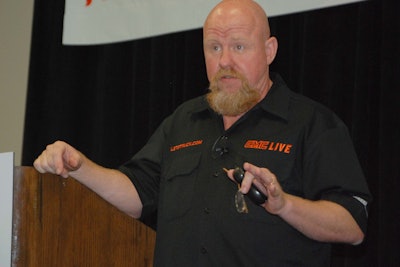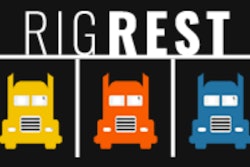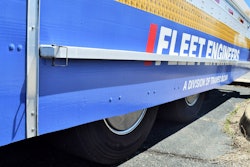Kevin Rutherford shared an observation about owner-operator risk-taking and income during a Mid-America Trucking Show seminar last month. While addressing various aspects of getting operating authority, a path chosen by an increasing number of leased operators, he focused on the challenges and tried to scare off those who weren’t prepared for becoming a one-truck motor carrier.
“In business, we usually trade risk for reward,” said Rutherford, a former small-fleet owner who’s well-known for his satellite radio trucking show and two decades of presenting Overdrive’s Partners in Business seminars. It follows that owner-operators assuming the risks of running independently should suffer the most in a downturn and profit the most in a strong market, like 2018’s.
 Kevin Rutherford warns leased operators to be well-prepared before striking out as an independent.
Kevin Rutherford warns leased operators to be well-prepared before striking out as an independent.“It’s not what the numbers show, though,” he said, citing year-end data from owner-operator financial services provider ATBS. “The independent owner-operators across the board made less in 2018 than owner-operators leased to carriers. That should have never happened.”
ATBS 2018 averages showed that for all owner-ops, net income rose $5,178 for the year, hitting a record high of $65,360. Independents averaged $64,216.
The largest segment of leased operators, dry van, earned $66,655. Leased operator customers in more specialized segments diverged widely from the other averages: $53,798 for reefer, $77,720 for flatbed.

Following Mid-America, ATBS CEO Todd Amen offered further analysis of the income data.
“I think the difference in the net income likely has to do with the wide variety of independents we work with,” he said. “There are some part-timers that don’t put in a full year’s work. That’s why they are independent. They’d skew the average low. We certainly had independents that earned over $100,000 net last year. As an average, the leased guys would probably show more simply because they all work hard all the time.”
While a precise apples-and-apples comparison between the incomes of leased and independent operators might be out of reach, it’s worth noting Rutherford’s main point: Just because you take more risk by running independently during a booming market, it’s no guarantee that gamble will pay off in spades. You can hear many of the other points Rutherford covered at MATS in this week’s Overdrive Radio podcast that condenses his presentation — the other principal voice during the ending question-and-answer session is that of Brent Hutto of Truckstop.com, who helped moderate the session. Take a listen:
Podcast: Play in new window | Download
The most common instances of missing out on upside potential, Rutherford says, happen when entrepreneurs aren’t prepared to run their business like a real business. That means operating by the numbers, such as tracking cost per mile and other critical indicators. Rutherford says that intimate familiarity with key business measurements is a rarity among the owner-ops he’s worked with or interviewed through his radio show or the years when he processed owner-op tax returns.
Properly running as a small motor carrier also means embracing new responsibilities, he said, such as establishing regular customers and handling compliance matters that had been handled before by fleet management.
The rush to establish new small fleets has been a byproduct of the healthy trucking market following the last recession, reported Overdrive’s James Jaillet. The number of registered carriers with six or fewer trucks grew by 72 percent from February 2012 to July of 2018, according to data from Qualified Carriers, a compliance and safety consultant. That’s an increase of 78,624 fleets — from 109,009 to 187,633 – in roughly six years.









